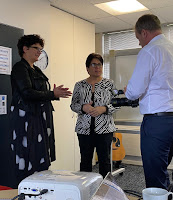Our school uses the 'C2C' (Coach2Coach) model as part of our appraisal process. When I first started as Principal, I could see that teachers valued the process and enjoyed the learning achieved through this approach. I knew growth coaching was a system I needed to learn and fast, so I enrolled in the Introduction to Leadership Coaching course facilitated by The Education Group. It just so happened that the previous principal of our school now worked as a facilitator of coaching with this group, so I was fortunate to have her guiding this two day workshop. The workshop served as a good introduction to understanding the process and benefits of it to my staff, however as a newby to coaching, my skills in this as apposed to mentoring, which I was more familiar with, needed a lot of work. I felt as though I stumbled through the process with the poor teachers who were my coachees. My questioning techniques were very poor and I couldn't help myself in giving advice as sessions went on. I knew I wasn't doing it right and apologised to my coachee on a number of occasions but she was gracious in working with me throughout the year.
This year, I made it a goal to work on my coaching skills and further highlight coaching as a means for PLD and inquiry with our staff. We had 8 staff members, both new and old who had not been on coaching PLD so we made the decision to get them started through the Video Enhanced Coaching workshops. Unfortunately, COVID had a hand in postponing these workshops as the year progressed, so it wasn't until term 3 that we managed to attend our courses. While those staff partook in video coaching, I began the level 2&3 accredited coaching course. These courses are intended to grow the skills of teachers involved and further embed the value of the coaching programme at our school. For me there was plenty to take away from the 2 day workshop I attended at Level 2 of accreditation. My understanding of the process is much clearer and with that so too is my understanding of the role of a coach. We unpacked the different types of support given across different spaces i.e: Counselling, training, mentoring, consulting and coaching. That clarity gave me a much improved understanding of how the questioning worked in the coaching process. I feel much more confident in how to question my coachee and the benefits of coaching compared to mentoring.
We were asked to identify an imaginary 'board of directors' - a small group of people you would select as a board of leaders you most admire - it could be anyone in the world. I went all out and listed Jacinda Adern, Michelle Obama, Brene Brown, Maya Angelou - to name a few. We then identified qualities these people had that you considered admirable in a leader/coach. Top of the list for me was trustworthy, I felt that all of these people gained my trust through their honesty of experience, their passion for what they believe in and their willingness to share it...and their vulnerability in doing so. By unpacking this, I was made more aware of the importance of trust as a coach and made me consider how I can gain the trust of my coachee. The topic of a 'Coaching way of being' was also interesting and gave me heightened awareness of what that means and looks like. I reflected on whether I had a coaching way of being as a school leader and now have my own areas to work on within this. I realised that I have a pretty healthy unconditional positive regard for most things - I try to keep this focus for staff otherwise negativity from the top will only drag everyone down. I do know that mindfulness and growth mindset need to be more openly practiced with staff to imbed it in the culture of the school. This is something I want to work on within my own leadership practice. There is still much to done on my coaching journey, but I feel after this workshop, I am now on my way to growing my own coaching 'way of being'.




